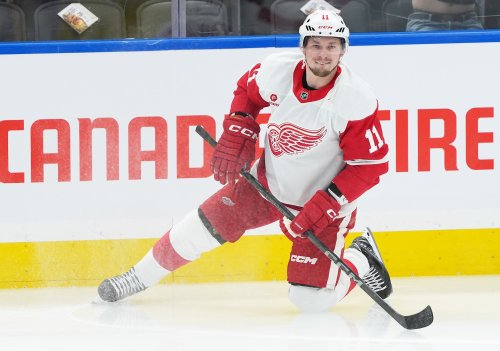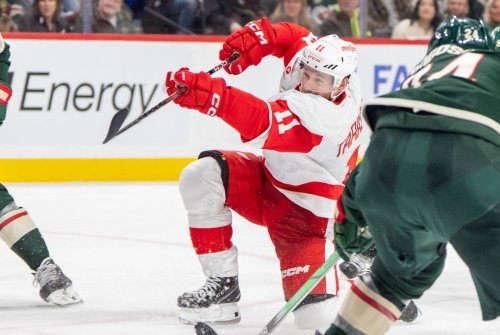
It's no secret that last night's game between the Minnesota Wild and the Boston Bruins has encouraged...strong emotions among the Wild fan base. It's a game that cost the Wild in the standings, cost them a key player, and was reminiscent of the soft play the team exhibited throughout its lowest points of past years. In short, it's a loss that's becoming more and more bitter as time goes on.
But the real cost of the game, the real encapsulating moments of the game weren't just those in which Loui Eriksson ran roughshod over the Wild's defense and Devan Dubnyk. It wasn't when Ryan Carter took on two Bruins grinders against the end boards. It wasn't when Matt Beleskey decided that an essential play in the waning seconds of the game was to take Jason Zucker down at his Achilles...knee (I really wish that image would fit better).
No, last night's game was decided by the Wild's inability -- their unwillingness -- to punish the Bruins for their early slew of penalties. It was power play after power play upon which the Wild failed to capitalize. Their failure to right the scoreboard when the Bruins went to the box sent the message that cheap plays are entirely acceptable because there's no real cost to them. It sent the message that, yes you can mess with the Wild because there the only real cost is you'll have more space to work with on defense and you'll have one well-rested player coming off in two minutes.
Early in the season, the Wild had looked like a bizarro version of themselves, at times among the top four in PP% and goals scored, and in the bottom four of PK%. They were able to sink pucks, mostly at the force of Zach Parise's will. The team wasn't bitten by the injury bug (not yet, at least), it was bitten by early struggles from some of its best players, but those struggles were easily overcome as the rest of the team gelled around them. However, an injury to Parise has now left them hobbled on the PP, and has forced the Wild to invent ways to cope. To state it simply, they haven't coped well.
When your team starts taking dirty hits, you have three options, typically. First, you can score. You can use their weakness on the ice and use it to hurt them on the scoreboard. Second, you can fight, taking the physical game back to them and exact eye for an eye justice; you can escalate the conflict to see who backs down first. Third, you can do nothing and roll over.
Throughout the early season, the Wild took the first option, and it served them well, earning them a franchise-best start and getting them solid footing in the Central. But lately, they've looked to enforcers and options two and three more and more. Their game last night and their games over the past few weeks have revolved around their response to chippy, ugly play. Teams' seasons revolve around these kind of responses, and the Wild are taking the wrong tact in response to a slew of injuries to key players.
Proof positive of the ineffectiveness of grit as a deterrent to aggressive, violent play came last night in the last minutes of the game. Following some tight play near the end boards, Carter got into it with not one, but two Bruins players. Regardless of my or your thoughts on fighting in the NHL, we should all maybe agree that fighting is a one-on-one activity. The two-on-one fashion of the tussle is besides the point; Carter's fight put the Wild squarely on the path of escalation as opposed to scoring. Late, in a frustrating game, there's no way to really change that scoreboard, aside from, you know, scoring, so the temptation is to fight, to exact that frustration on your opponent.
The immediate impact of Carter's play may have been a deterrent to dirty play, but in the end it was a short-lived threat that only escalated tempers. Those tempers boiled over in the remaining minutes of the game. The combination of high tempers and a Wild team not punishing the Bruins for their cheap play by scoring on them gave Beleskey license to target Zucker from behind. By committing to a fight, you commit to the escalation of violence and the escalation of stakes across the board and throughout both rosters. At the individual level, players may be willing to suffer the physical consequences of fights, but their actions don't just have immediate repercussions for themselves, they have repercussions for the rest of their roster, the rest of the game, and the near future.
The real importance of the Wild's inability to score on power play chances isn't just in last nights 4-2 loss, it's in the damage it brought to Zucker, the damage it's brought to players in the past, and the message it sends that the Wild is a willing partner in the physical escalation of the game. early in the season, they didn't bite on the physical bait left out by their opponents, leading some fans and observers to call them soft. When it comes down to it, I'd rather take the blow of being called soft than the blow of a stick to the knee.
Think you could write a story like this? Hockey Wilderness wants you to develop your voice, find an audience, and we'll pay you to do it. Just fill out this form.








Recommended Comments
There are no comments to display.
Join the conversation
You can post now and register later. If you have an account, sign in now to post with your account.
Note: Your post will require moderator approval before it will be visible.